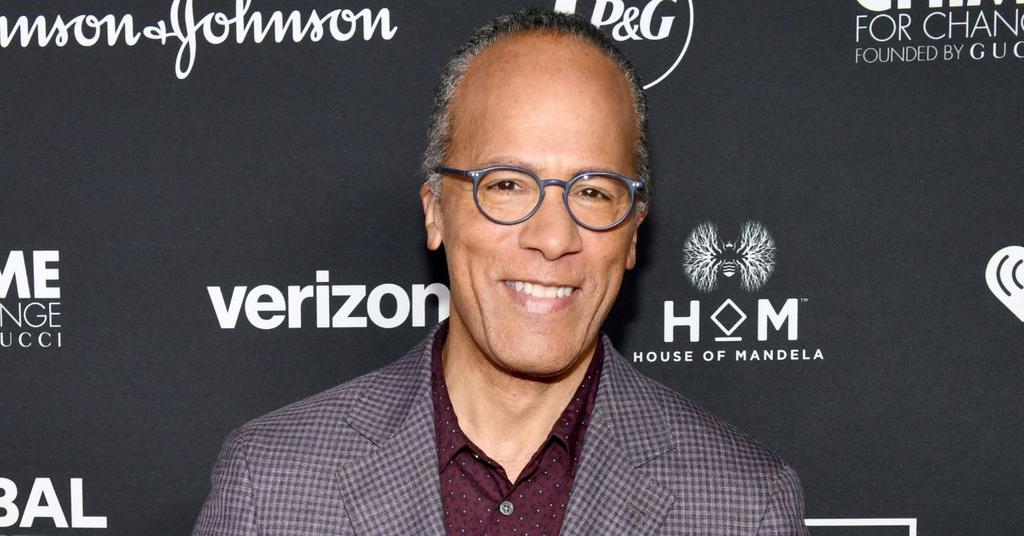Lester Holt Health Problems: The Inside Scoop You Need To Know
Let’s talk about something serious but keep it real, folks. Lester Holt, the guy you see delivering the news every night, has faced some health challenges that deserve our attention. It’s not just about the man behind the desk; it’s about how he handles life’s curveballs with grace and resilience. You might be wondering, “What’s the deal with Lester Holt’s health?” Well, buckle up because we’re diving deep into this topic.
Now, let’s get one thing straight—Lester Holt isn’t just another TV anchor. He’s the guy who keeps us informed on the latest news, weather, and world events. But beyond the polished suit and confident demeanor, there’s a human story unfolding. This article isn’t just about his health issues; it’s about understanding the bigger picture and learning from his journey.
We all know that health problems don’t discriminate, and even the people we admire most can face unexpected challenges. So, whether you’re a die-hard fan of Lester Holt or just curious about the man behind the headlines, this article has got you covered. Stick around, and we’ll break it down piece by piece.
Read also:Belinda Nohemy Leaks The Untold Story Facts And What You Need To Know
Who Is Lester Holt? A Quick Bio
Before we dive into Lester Holt’s health problems, let’s take a moment to understand the man himself. Lester Holt is more than just a name on your TV screen. He’s a seasoned journalist with decades of experience under his belt. Born on November 10, 1959, in Los Angeles, California, Lester has become a household name in the world of journalism.
Here’s a quick snapshot of his life:
| Full Name | Lester Donnell Holt |
|---|---|
| Date of Birth | November 10, 1959 |
| Place of Birth | Los Angeles, California |
| Profession | Journalist, News Anchor |
| Education | California State University, Northridge (B.A. in Communications) |
| Notable Achievements | First African-American to anchor a nightly national news broadcast on a major U.S. network |
Lester Holt Health Problems: The Journey Begins
Alright, let’s talk about the elephant in the room. Lester Holt’s health problems have been a topic of conversation for a while now. In 2015, the news broke that Lester was diagnosed with prostate cancer. Now, that’s a big deal, and it’s not something you hear every day. But here’s the thing—Lester handled it like a champ.
Instead of shying away from the spotlight, he used his platform to raise awareness about prostate cancer. He encouraged men, especially African-American men, to get regular check-ups and screenings. It’s a powerful message, and it shows just how much Lester cares about the community he serves.
Prostate Cancer: The Silent Threat
Prostate cancer is one of those things that can sneak up on you. According to the American Cancer Society, about 1 in 8 men will be diagnosed with prostate cancer during their lifetime. But here’s the kicker—it’s often treatable if caught early. Lester’s diagnosis was a wake-up call for many, and he didn’t hesitate to share his story.
- Prostate cancer is the second most common cancer in men worldwide.
- African-American men are at higher risk of developing prostate cancer.
- Regular screenings can significantly improve the chances of early detection.
How Lester Holt Fought Back
When life throws you a curveball, how you respond defines you. Lester Holt didn’t let prostate cancer define him. Instead, he took charge of his health and underwent treatment with determination. It wasn’t easy, but he came out on the other side stronger and wiser.
Read also:Nora Fawn Of Leak The Inside Story You Need To Know
Here’s how Lester approached his battle:
- He underwent surgery to remove the cancerous tissue.
- He followed up with regular check-ups to monitor his health.
- He prioritized a healthy lifestyle, including a balanced diet and regular exercise.
The Importance of Early Detection
One of the key lessons from Lester Holt’s story is the importance of early detection. Prostate cancer can be asymptomatic in its early stages, which is why regular screenings are crucial. Men, especially those at higher risk, should talk to their doctors about when to start screenings.
According to the Centers for Disease Control and Prevention (CDC), prostate-specific antigen (PSA) tests and digital rectal exams (DRE) are common screening methods. These tests can help detect prostate cancer early, increasing the chances of successful treatment.
Lester Holt’s Health Advocacy
Lester Holt didn’t stop at sharing his personal story. He became an advocate for men’s health, using his platform to educate and inspire others. His advocacy extends beyond prostate cancer, touching on broader health issues that affect men.
Here are some ways Lester has made a difference:
- He partnered with organizations like the Prostate Cancer Foundation to raise awareness.
- He encourages men to prioritize their health and not shy away from seeking medical advice.
- He emphasizes the importance of mental health, urging men to open up about their struggles.
Mental Health: The Silent Battle
While prostate cancer was the most publicized aspect of Lester Holt’s health journey, it’s worth noting that mental health is another battle many men face. Lester has spoken openly about the importance of mental well-being and the need to break down stigmas surrounding mental health.
According to the National Institute of Mental Health, men are less likely to seek help for mental health issues compared to women. Lester’s message is clear: it’s okay to ask for help, and taking care of your mental health is just as important as taking care of your physical health.
Lessons Learned from Lester Holt’s Journey
Lester Holt’s health problems have taught us valuable lessons about resilience, advocacy, and the importance of proactive health management. His journey is a testament to the fact that even the strongest among us can face challenges, but it’s how we respond that truly matters.
Here are some key takeaways from Lester’s story:
- Early detection saves lives—don’t skip those screenings.
- Advocacy can make a difference—use your voice to raise awareness.
- Mental health matters—prioritize your emotional well-being.
Proactive Health Management
Proactive health management is all about taking control of your well-being. Lester Holt’s story highlights the importance of regular check-ups, screenings, and a healthy lifestyle. It’s not just about reacting to problems when they arise; it’s about preventing them before they become serious.
Here are some tips for proactive health management:
- Schedule regular health check-ups with your doctor.
- Stay informed about your family’s medical history.
- Adopt a balanced diet and exercise regularly.
The Future of Men’s Health
As we look to the future, it’s clear that men’s health will continue to be a critical focus area. Advances in medical technology, increased awareness, and changing societal attitudes are all contributing to a brighter outlook. Lester Holt’s journey is just one example of how individual stories can inspire systemic change.
Here’s what the future holds for men’s health:
- Improved screening methods for early detection of diseases.
- Increased focus on mental health awareness and support.
- More resources and initiatives aimed at promoting men’s health.
Breaking Down Stigmas
One of the biggest challenges in men’s health is breaking down the stigmas that prevent men from seeking help. Whether it’s about physical or mental health, the idea that “men don’t talk about their feelings” needs to change. Lester Holt’s advocacy is a step in the right direction, encouraging men to prioritize their health without fear of judgment.
Conclusion: What Can You Do?
So, here’s the deal. Lester Holt’s health problems have given us a lot to think about. His journey is a reminder that health is a priority, not an afterthought. Whether it’s prostate cancer, mental health, or general well-being, taking charge of your health is the best thing you can do for yourself.
Here’s what you can do:
- Get regular check-ups and screenings.
- Talk to your doctor about any concerns you may have.
- Prioritize your mental health and don’t hesitate to seek support.
And don’t forget to share this article with your friends and family. Let’s keep the conversation going and make a difference in the world of men’s health. Remember, knowledge is power, and together, we can create a healthier future.
Table of Contents
- Lester Holt Health Problems: The Inside Scoop You Need to Know
- Who Is Lester Holt? A Quick Bio
- Lester Holt Health Problems: The Journey Begins
- Prostate Cancer: The Silent Threat
- How Lester Holt Fought Back
- The Importance of Early Detection
- Lester Holt’s Health Advocacy
- Mental Health: The Silent Battle
- Lessons Learned from Lester Holt’s Journey
- Proactive Health Management
- The Future of Men’s Health
- Breaking Down Stigmas
- Conclusion: What Can You Do?
Article Recommendations

